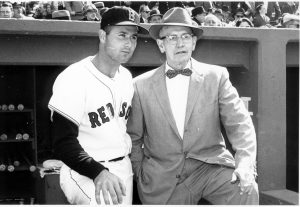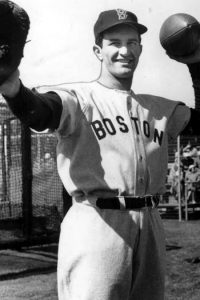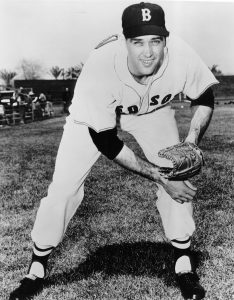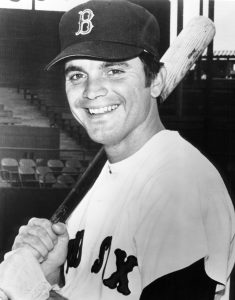Former Red Sox pitcher Bill Monbouquette never forgot his 18th birthday. That birthday is a milestone for all of us, but Bill spent his 18th birthday on the mound at the old Polo Grounds, Long-time home of the New York Giants, pitching for US All-Stars against the New York All-Star team in 1954 Hearst Sandlot Classic.
“What a thrill that was,” Bill recalled in an April 2014 interview in his Gloucester, MA, home. “Here I was, a kid from Medford, MA, pitching in a major league stadium that seated over 50,000 fans, pitching against some of the best young players in the country.”
 Mombo, who passed away in January 2015, pitched for the Red Sox from 1958 to 1965 and was inducted into the Boston Red Sox Hall of Fame in 2000. He was the starting pitcher for the 1954 US All-Stars but he didn’t remember being nervous. Bill insisted, “I really wasn’t nervous. I felt some nerves just before the first pitch, but then I just settled in.”
Mombo, who passed away in January 2015, pitched for the Red Sox from 1958 to 1965 and was inducted into the Boston Red Sox Hall of Fame in 2000. He was the starting pitcher for the 1954 US All-Stars but he didn’t remember being nervous. Bill insisted, “I really wasn’t nervous. I felt some nerves just before the first pitch, but then I just settled in.”
Settling in is an understatement as Mombo pitched two scoreless innings against the New York All-Stars, striking out five of the six batters he faced. His effort earned him MVP honors based on a unanimous vote of the 16 baseball writers covering the game.
THE HEARST SANDLOT CLASSIC
The Hearst Sandlot Classic began in 1946, with the financial support of newspaper publisher William Randolph Hearst. Sportswriter Max Kase of Heart’s flagship newspaper the New York Journal American came up with the idea. Kase convinced Hearst, who had newspapers in nearly 30 cities located throughout the US at the time, to champion the program.
Every city with a Hearst newspaper was eligible to send a local player to New York to participate in a game at a major league stadium against an all-star team assembled from the Greater New York area. Each paper was allowed to develop their criteria but the system used in Boston was the most common approach.
“First they held tryouts,” Mombo remembered looking back at the Boston Record-American system. “Ironically, I was cut after my first tryout for the Boston All-Stars. But they took another look and I made the New England All-Star team.
“We [the New England All-Stars] played one game at a field in Gloucester and I struck out 12 batters in four innings,” he recalled. “Then we played the final game at Fenway Park and I struck out five of the six batters. That earned me the MVP award and a trip to New York City.”
FUTURE RED SOX PLAYERS
The first future Red Sox player to appear in the Hearst Sandlot Classic was Harry Agganis, who played in the 1947 game before a crowd 31,232 fans at the Polo Grounds. Agganis, who had just finished his junior year at Lynn Classical High School, was already widely-known in the Boston area for his success on the gridiron and baseball diamond. 
During Harry’s trip to New York, the All-Stars took in the sights and attended a Broadway show—“Annie Get Your Gun”– starring the iconic actress Ethel Merman. The All-Stars went backstage to meet Ms. Merman who said Agganis looked like a “Greek God.”
Harry would go on to become an All-American quarterback at Boston University, where he was dubbed “The Golden Greek,” before signing with the Red Sox in 1952. Agganis was in his second year as the Red Sox first baseman when he died tragically of a massive pulmonary embolism on June 27, 1955.
The next future Red Sox player to appear in the Hearst Sandlot Classic was Gene Conley, who pitched for the Red Sox from 1961 to 1963. Conley pitched three innings for the US team in 1949, and he was the winning pitcher.
In an interview several years ago Gene told me, “I was just a teenager from Richland, WA, and I was a long way from home. It felt great to pitch well and get the win. Before that I was focused on basketball but that game started me thinking about a baseball career.”
Conley signed with the Boston Braves in 1950, after his sophomore year at Washington State. He pitched briefly for the 1952 Boston Braves and later played for the Boston Celtics, making him the only person to play for the Red Sox, the Braves and the Celtics. 
Bill Monbouquette wasn’t the only future Red Sox player in the 1954 Hearst Sandlot Classic. Gary Bell, who pitched for the Red Sox in 1967 and 1968, represented The San Antonio Light on the US team.
“That was a big deal for me,” Gary told me in an earlier interview. “It was a chance to play in a big league stadium in front of scouts from every team. I ended up signing with the Cleveland Indians and in 1955 I was pitching in their minor league system.”
The late Russ Gibson, who caught for the Red Sox between 1967 and 1969, played for the US team in 1956, and he loved to reminisce about the experience. “There I was, a 17 year-old kid from Fall River [MA], playing in the Polo Grounds with some of the best players in the country,” he told me in 2007. “Wow, what an experience for a teenager!
“I got to catch and Mike McCormick, who had a terrific career in the big leagues, was our pitcher,” Russ recalled. “Mike McCormick was also the last pitcher I ever caught in the big leagues when we were both with the San Francisco Giants in 1972. What goes around really does come around,” he marveled.
YANKEE STADIUM
After the 1957 season the Giants moved to San Francisco and the last time the Polo Grounds was used for the Hearst Sandlot Classic was the 1958 All-Star game. The following year the game moved to Yankee Stadium and future Red Sox pitcher Wilbur Wood represented Boston on the 1959 US All-Star team.
Wood, who was a three-sport all-star at Belmont High School, was the winning pitcher in the 13-4 US victory. He pitched for the Red Sox between 1961 and 1964, and became a three-time All-Star with the Chicago White Sox after mastering the knuckleball.
A second Boston representative, Bobby Guindon of English High School, had an RBI single for the US in 1959, and later appeared in five games with the Red Sox in 1964.
Harry Agganis of Lynn Classical High School was the first future Red Sox player to appear in the Hearst Sandlot Classic and Tony Conigliaro of St. Mary’s of Lynn High School was the last future Boston player to represent the US All-Stars. Tony C. had an RBI single in the 1962 Classic at Yankee Stadium and he was managed by Eddie Joost, who had finished his 17-year MLB career with the 1955 Red Sox.
 Less than two years later Conig was the starting center fielder for the Red Sox on Opening Day in 1964. Tony became the youngest AL player to reach 100 career home runs in 1967. Following his tragic beaning in August 1967, Tony was named AL Comeback Player of the year in 1969, and he finished his Red Sox career after his second valiant comeback attempt in 1975.
Less than two years later Conig was the starting center fielder for the Red Sox on Opening Day in 1964. Tony became the youngest AL player to reach 100 career home runs in 1967. Following his tragic beaning in August 1967, Tony was named AL Comeback Player of the year in 1969, and he finished his Red Sox career after his second valiant comeback attempt in 1975.
The final Hearst Sandlot Classic was played in Yankee Stadium in 1965, before 16,191 fans. Two New York City newspaper strikes put the New York Journal American out of business and forced Hearst Publishing to withdraw its sponsorship.
Today the Hearst Sandlot Classic is a largely forgotten piece of Americana. But it will never be forgotten by the more than 1,000 Al-Star players or their families.
Bill Monbouquette recalled, “They put us up in a first-class hotel, took us on a boat cruise around the city and to a Broadway show. My father came with me and we had a great time.
“I got to practice at Yankee Stadium and play a game at the Polo Ground. It was the kind of experience that you always remember.”
If you would like to learn more about the Hearst Sandlot Classic, Alan Cohen published a comprehensive history in the Fall 2013 Baseball Research Journal of SABR. It can be found at
http://sabr.org/research/hearst-sandlot-classic-more-doorway-big-leagues
Portions of this article first appeared in the Red Sox publication Diamond Days. To subscribe to Red Sox Magazine click here.


At 78 years old and health not the best I would just like to say that I played in this ALL-STAR GAME in 1954. The brain is a little Fuzzy going back that many years but if I remember right the rotation of the first three pitcher was Momboquette Latman, and myself. I remember we stayed at the Hotel New Yorker and I was just Awestruck by this big and beautiful city. I never saw so many people going back and forth up and down and around and around. They wined us and dined us like we were kings and sometimes I thought I was one
. To see Yankee stadium and practice their and just to think all the great ball players that played in the stadium down through the years you actually got the shivers just thinking about it. Then over to the Polo Grounds all the same feelings coming back to you just like they did when you were at Yankee Stadium. Then all the sightseeing it would make your head swim, Cony island the Empire State Building, Time Squire and on and on how much can a 18teen year old take.
One night we were out on the town and somehow the three or four of us got separated and I was on my own and to be very honest I was scared so I hailed down a cab and told him to take me to the hotel New Yorker and on the drive their the cab driver and I started talking and I mentioned why I was in New York and could not believe it but he asked for my autograph, the first and last time I ever gave out my autograph. It was a good feeling. I have just touched the surface here and I do not know where this will end up but it was nice talking about a 18 year old on a August week or so in New York City. Now that I am in the sunset of my life I once read that you can have many things in this life but what you can’t have is TIME. Makes sense to me.
BILL MONBOUQUETTE DEPARTED THE SCENE ON
SUNDAY 25 JANUARY 2015 AT THE AGE OF 78 …
He played in Major League Baseball (MLB) for the
Boston Red Sox (1958–1965), Detroit Tigers (1966–1967),
New York Yankees (1967–1968), and the San Francisco Giants (1968).
A TRULY FINE GENTLEMAN WHO WILL BE FONDLY
REMEMBERED FOREVER BY ALL THOSE OF US WHO
KNEW HIM OR EVER MET HIM OVER TIME …
ONLY GOD KNOWS HOW WELL YOU PLAYED THE GAME
THANKS FOR EVERYTHING, BILL.